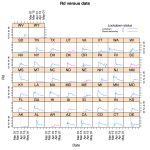Jeff, I am sorry if it caused a mis-perception of the contents of the article and have modified my post to correct it. Thank you again for correcting my error. In general I do verify the content before quoting an article or making a major point based on the contents. In this case, I was simply trying to post the article for the interest of the group and did not perform adequate checking and was mostly trying to simply provide something rather than a raw link. Would you have been happier if I had simply linked to the Telegraph story? I guess then people would have assumed it was just a Telegraph story rather than a pre-print of a scientific article. I agree with you that a greater degree of care is needed by those of us who are professional scientists.Jeff Oslick said:Since you are a scientist, I would expect you to at least skim a publicly available manuscript to verify the content before quoting a headline from the Telegraph, or any general news source.
In any case, yes, I do not think most people distinguish carefully enough between what the government does coercively and what is perhaps the result of voluntary action. I imagine the reporter at the Telegraph is one such individual who just introduced the notion of lockdowns being involved into their headline.
In the specific instance of Covid-19, for example, I imagine most people are unaware that the majority of social distancing that occurred was apparently voluntary prior to government lockdowns, which followed a few weeks later in most states after the mobility data has a sharp downturn. Many people I have discussed this with just assume that the slowing of the rate of growth of cases which has occurred was the result of the coercive lockdowns in cases where it occurred.

